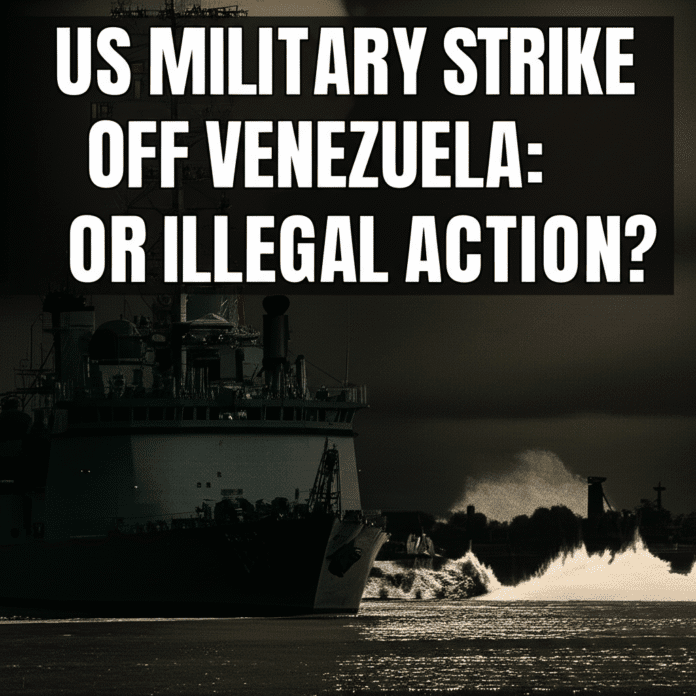A controversial maritime strike ignites a fierce debate over presidential power, military force, and the rule of law on the high seas.
A recent U.S. military strike on a vessel off the coast of Venezuela has thrown Washington into a heated debate, pitting the Trump administration’s claims of self-defense against accusations of reckless executive overreach. The administration alleges the boat was linked to the dangerous Tren de Aragua cartel and posed a threat, justifying the use of force. However, with sources telling the Associated Press the vessel was simply returning to shore, members of Congress and legal experts are demanding answers, questioning the legality of the strike and the very identity of those onboard. This incident raises a critical question for all Americans: where is the line between national security and unchecked military aggression?
The Official Narrative: A Strike Against “Narco-Terrorists”
According to national security officials, the incident was a necessary act of self-defense. The administration’s account paints a picture of a tense encounter where a suspicious vessel, after being hailed, suddenly changed course and acted aggressively toward a U.S. military ship. This maneuver, they claim, triggered the use of force.
Citing Drug Trafficking and Self-Defense
The White House promptly justified the strike on two main grounds: combating drug trafficking and the inherent right to self-defense. Pentagon spokesperson Sean Parnell stood firmly by the decision, stating that the military “will employ all available measures to combat drug cartels,” framing the incident as a clear-cut episode in the ongoing war on drugs.
Furthermore, the administration identified the passengers as affiliates of Tren de Aragua, a notorious and violent Venezuelan gang. This labeling was crucial, as it sought to cast the individuals not as civilians, but as dangerous criminals tied to a transnational criminal organization, thereby elevating the perceived threat level.
A Chorus of Dissent: Questions of Authority and Evidence
The administration’s narrative was immediately met with skepticism and sharp criticism, primarily from Democratic senators and national security analysts who questioned both the evidence and the legal authority for the strike.
“Not Law Enforcement”
The core of the opposition was articulated by Senator Jack Reed, a prominent voice on military affairs. He underscored a fundamental principle of American governance, stating that the military’s role does not include acting as law enforcement. This distinction is critical. Law enforcement operates under a different set of rules of engagement, prioritizing arrest and due process, whereas the military is trained for combat against enemy forces.
“There is a significant absence of evidence that the boat was involved in hostile actions or drug trafficking,” Senator Reed emphasized, pointing to the lack of public proof to substantiate the administration’s claims.
This lack of evidence has become the central point of contention. Critics argue that without clear, verifiable intelligence showing the vessel posed an imminent threat or was actively engaged in illicit activities, the strike looks less like a defensive measure and more like a summary execution on the high seas.
Congressional Demands for Transparency
The incident has triggered alarm bells in Congress regarding the scope of executive power. Lawmakers are demanding more details, fearing this could be another example of a president bypassing congressional authority to conduct military operations. The concern is that such actions, taken without oversight or a clear legal framework like a declaration of war or Authorization for Use of Military Force (AUMF), set a dangerous precedent for future encounters.
The Venezuelan Response: A “Tremendous Lie”
Unsurprisingly, the Venezuelan government has vehemently rejected the U.S. account of the incident. Interior Minister Diosdado Cabello, a high-ranking official in Caracas, flatly dismissed the American narrative as a “tremendous lie.”
Cabello announced that Venezuelan authorities have launched their own investigation into the strike. While details from their side remain scarce, the forceful denial adds another layer of international complexity to the situation. The Venezuelan government’s position portrays the U.S. action as an act of aggression within its sphere of influence, further straining the already toxic relationship between the two nations. This conflicting narrative ensures that the truth of what happened in the waters off Venezuela will remain buried under a mountain of geopolitical posturing and mutual distrust.
A Dangerous Precedent and a Call for Accountability
The strike off the Venezuelan coast is more than just a single maritime incident; it is a flashpoint in an ongoing struggle over the limits of presidential power and the role of the U.S. military. The Trump administration’s justification of self-defense and anti-cartel operations is being challenged by a profound lack of public evidence and serious legal questions raised by members of Congress.
Was this a legitimate military engagement against dangerous criminals, or was it a tragic mistake born from an overly aggressive posture and a disregard for international and domestic law? The answer remains unclear, hidden behind a veil of classified intelligence and political spin.
This ambiguity is dangerous. It erodes public trust, damages international relations, and sets a precedent for future military actions with little to no oversight. It is imperative that we, as citizens, demand clarity and accountability from our elected officials.
Your voice is crucial. Contact your representatives in Congress and demand a full, transparent investigation into this incident. Ask them to hold public hearings and ensure that the executive branch is not unilaterally deciding when and where to use lethal force. The principles of due process and congressional oversight are pillars of our democracy—they must be defended, especially when lives are at stake.



